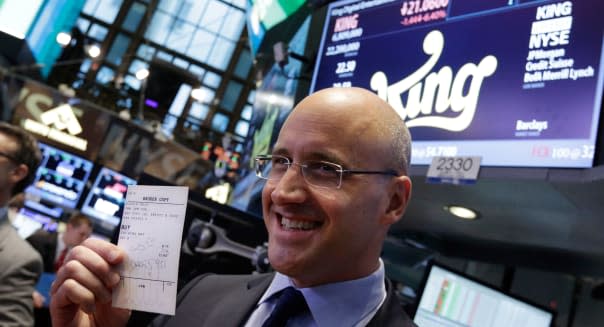Why the Candy Crush IPO Was Nearly Perfect -- for Some

King Digital (KING), the company behind the wildly popular Candy Crush Saga mobile game, completed its initial public offering on Wednesday. Contrary to popular opinion, it was an incredible success -- for some involved in the transaction.
The company floated 22.2 million shares at $22.50 per share. That event poured about $326 million into King Digital's coffers, and insiders and early investors grossed around $150 million by unloading their stakes in that IPO.
What made this an almost perfect offering for King Digital, insiders and individual investors is that its shares never once traded above its IPO price in its first day of trading. The company raised capital, the insiders got their huge payday, and the net cost in terms of control of the business to the early owners was as small as it could have been for the amount of cash raised.
The Game Behind the IPO Game
The old joke on Wall Street is that the acronym IPO really means "It's Probably Overpriced." Indeed, most IPOs, after the potential for an initial pop, generally underperform the market for quite some time after going public.
The typical structure of an IPO creates the ideal conditions for that initial pop. The early offering typically includes a "restriction period" under which insiders can't unload more shares. The key reason behind those rules is to restrict the number of shares initially on the market. In King Digital's case, the restriction period is 181 days.
Generally, the less supply there is of something, the greater the price for a given level of demand. By offering, then restricting shares, a key (though generally unstated) objective of underwriters is to help their favored clients profit by unloading into an early trading pop.
If a hypothetical company IPOs at $10 then immediately pops to $15, favored clients of the underwriters who got to buy into the IPO for $10 make 50 percent in a snap. The potential for that pop helps underwriters place IPOs to investors blinded to the investing risks by the easy money they could earn if their IPO pops.
The standard playbook for who typically wins and who loses in an IPO goes something like this:
Company and its insiders: Win by getting cash in exchange for a share of company control
Underwriters: Win by getting millions in fees for the IPO and maybe gaining clients for future IPOs
Favored clients of underwriters: Win by getting easy money from an IPO pop
Retail investors who buy on IPO day: Lose by buying an asset likely to underperform for quite some time.
That's not how this IPO played out.
Win-Win-Lose Situation
King Digital's shares fell instantly upon its IPO. And the share price never went above the initial IPO price. That's great news for the insiders and the company. They got the most they possibly could have, for the least net cost in terms of control of their business. From their perspective, it was a nearly perfect IPO.
%VIRTUAL-article-sponsoredlinks%The company and its insiders also got their cash. And because shares never traded above the IPO price, they were able to retain more control over the company and keep the future value of share price increases to themselves.
However, while the underwriters did a superb job for King Digital and insiders, they probably did themselves a bit of a disservice for their near-term future offerings. Since King's IPO didn't initially pop higher, their favored clients didn't make easy money on the deal and may think twice about investing in the next IPO the underwriters bring to them.
Here's One for the Little Guy
Retail investors, for once, didn't get the shortest end of the stick in this deal. Rather than being suckered in by the allure of trying to catch the tail end of an IPO pop, individual investors who wanted to buy King Digital but didn't get in on the IPO could get better pricing throughout the IPO trading day.
This IPO was a good drill for investors: If you're going to buy a stock, no matter what the company, have a stronger reason for buying it than "some other sucker will pay more when I flip it." Otherwise, you're likely to wind up being the sucker paying the most for it, like those who bought into King Digital's IPO in the hope of an initial pop.
Motley Fool contributor Chuck Saletta has no position in any stocks mentioned. The Motley Fool has no position in any of the stocks mentioned. Try any Motley Fool newsletter service free for 30 days and see how we pick stocks that pop over the long term.

